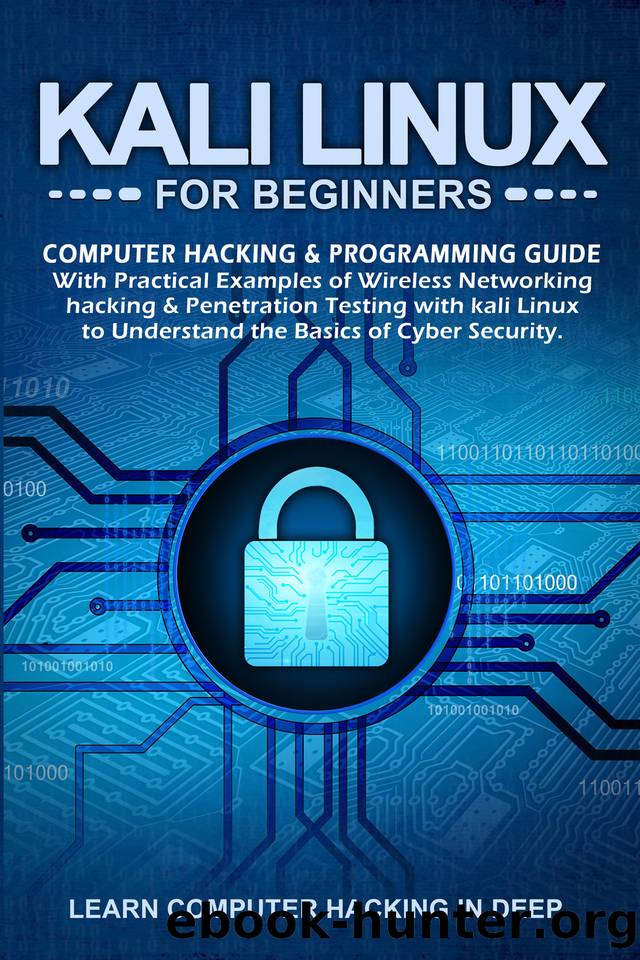Kali Linux for Beginners: Computer Hacking & Programming Guide With Practical Examples Of Wireless Networking Hacking & Penetration Testing With Kali Linux To Understand The Basics Of Cyber Security by Learn Computer Hacking In Deep

Author:Learn Computer Hacking In Deep [Hacking In Deep, Learn Computer]
Language: eng
Format: azw3
Published: 2020-04-12T16:00:00+00:00
Chapter 6: Programming Linux
Programming on Linux is used for creating interfaces, applications, software and programs. Linux code is often used for the desktop, embedded systems as well as for real-time programs. Linux is an open source OS kernel which is compatible with Perl, C++, Java and various other languages of programming.
How does Linux work?
Linux functions as the kernel of an OS which can also be distributed and shared freely. An operating system or OS is that interface which helps in connecting the users with the hardware of the computer and also supports the running of the applications and programs. Kernel is nothing but the OS core as it manages all the communication between the components of hardware and software.
What are the functions of the Linux programmers?
Starting off with Linux programming employs tools such as GBU compiler and debugger. They help in creating applications for the storage of data, construction of GUI and also script writing. More advanced applications related to Linux allow the programmers to develop software related to Linux. They also optimize the programs which are already existing and also write new programs with various complex form of features such as multiprocessing, multi-threading, inter-process communication and also interaction of hardware device.
Uses of Linux
Linux is widely used today in various servers, computer security systems and architecture of computer system. It is widely used in real-time programs along with the embedded systems of PDAs and cell phones. Linux programming has also resulted in various applications.
How to develop the modules of Kernel?
Before you start off with core programming in Linux, the best way of increasing your knowledge along with expertise of Linux programming is to start working on the kernel module. The modules are developed independently which works with the Linux kernels for functioning as a compact operating system. The kernel modules consist of various things such as drivers of devices for the several peripheries of hardware, file managers and other low-level features of the OS.
The only barrier that comes at the entry of kernel module is much lower in rate than there are for working on the kernel of Linux. There are several modules which are being developed by various individuals and teams. So, there is no specific gatekeeper at the entry of development.
Download
This site does not store any files on its server. We only index and link to content provided by other sites. Please contact the content providers to delete copyright contents if any and email us, we'll remove relevant links or contents immediately.
Kotlin in Action by Dmitry Jemerov(19231)
Grails in Action by Glen Smith Peter Ledbrook(16726)
Sass and Compass in Action by Wynn Netherland Nathan Weizenbaum Chris Eppstein Brandon Mathis(14217)
Azure Containers Explained by Wesley Haakman & Richard Hooper(7512)
Configuring Windows Server Hybrid Advanced Services Exam Ref AZ-801 by Chris Gill(7511)
Running Windows Containers on AWS by Marcio Morales(7063)
Microsoft 365 Identity and Services Exam Guide MS-100 by Aaron Guilmette(5447)
Microsoft Cybersecurity Architect Exam Ref SC-100 by Dwayne Natwick(5286)
Combating Crime on the Dark Web by Nearchos Nearchou(5033)
The Ruby Workshop by Akshat Paul Peter Philips Dániel Szabó and Cheyne Wallace(4716)
Management Strategies for the Cloud Revolution: How Cloud Computing Is Transforming Business and Why You Can't Afford to Be Left Behind by Charles Babcock(4562)
Python for Security and Networking - Third Edition by José Manuel Ortega(4286)
The Age of Surveillance Capitalism by Shoshana Zuboff(4272)
Learn Wireshark by Lisa Bock(4189)
Learn Windows PowerShell in a Month of Lunches by Don Jones(4175)
Ember.js in Action by Joachim Haagen Skeie(4052)
The Ultimate Docker Container Book by Schenker Gabriel N.;(3933)
DevSecOps in Practice with VMware Tanzu by Parth Pandit & Robert Hardt(3622)
Windows Ransomware Detection and Protection by Marius Sandbu(3593)
